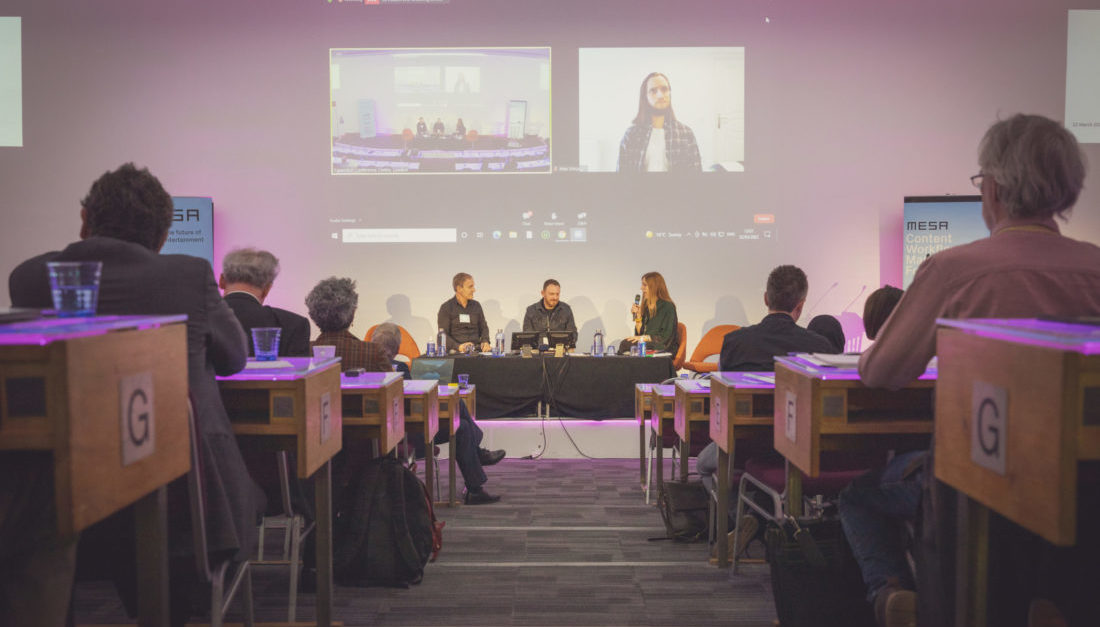M+E Daily

CWMF: Talent Crunch is Creating a Localization Challenge
Story Highlights
The localization industry is facing a major challenge now because of the small pool of talent available overall and the best translators all being used by many language service providers, according to industry experts who spoke 22nd March during the panel session “The Talent Crunch – Does it Exist and can it be Addressed?” at the sixth annual Content Workflow Management Forum.
The event was held in conjunction with the eighth annual Content Protection Summit Europe at the Cavendish Conference Center in London and as a virtual event via the MESAverse, allowing for remote attendance worldwide.
Finding talent and understanding the capabilities of the people an organization chooses to work on its titles is more important than ever as the amount of content requiring localising continues to grow significantly.
During the session, panelists discussed how collaborative industry initiatives can help find talent across multiple regions and countries and how the growing use of machine aided translation will impact the existing talent pool.
But the creative human element is a necessity to ensure the integrity of content and preserve the art of localization.
 One issue that the industry is facing now “from a talent crunch perspective is timeliness because I think it’s not necessarily just the amount of people – the amount of resource that we can put towards fulfilling a lot of localization contracts – but it’s about the time constraints that have been introduced as well,” according to Mazin Al-Jumaili, VP of talent management and business development at ZOO Digital.
One issue that the industry is facing now “from a talent crunch perspective is timeliness because I think it’s not necessarily just the amount of people – the amount of resource that we can put towards fulfilling a lot of localization contracts – but it’s about the time constraints that have been introduced as well,” according to Mazin Al-Jumaili, VP of talent management and business development at ZOO Digital.
Meanwhile, service providers are “handing out localization projects to the freelance community but we’re actually saying, ‘I need you to do it in a third of the amount of time,” he said.
Then there is also the “elephant in the room,” which is the “price constraint around that,” he pointed out, adding: “The pressure [falls] on us to be able to fulfil a better sort of price model for our freelance resources and we need to be able to explain how and why we manage that with them, and I think the responsibility is all of us now” to communicate that to content community partners and customers, he added.
Agreeing about the talent crunch the industry is now facing, Max Deryagin, academic liaison at AudioVisual Translators Europe (AVTE) said: “Definitely companies are fighting over translators and there’s a huge headhunt going on.”
To attract the most talented translators, companies are “offering much better rates …. Sometimes more than double,” said Deryagin. Better, relaxed working conditions are also heavily in demand by talent, he noted, adding payment is now often being offered via a retainer, a monthly flat fee as an incentive to prioritize an organizations projects, he added.
The days of a traditional work day, meanwhile, no longer exist and stress levels are high because so many people are working around the clock in many cases, according to Deryagin. This, “of course, leads to burnout,” he said, noting it happened to him recently also.
That issue must be solved or it stands to make the talent crunch even worse, Deryagin warned.
On the education front, Jorge Diaz-Cintas, professor of translation studies at University College London, said more schools around the world also need to be teaching localization skills across multiple languages to help solve the talent crunch.
Yota Georgakopoulou, director of Athena Consultancy, served as the session’s moderator.
To view the presentation, click here.
The sixth annual Content Workflow Management Forum was produced by MESA in association with CDSA, the Hollywood IT Society (HITS), the Smart Content Council, the Content Localisation Council, and presented by Convergent Risks, with sponsorship by archTIS, NAGRA, Signiant, Whip Media, AppTek, BuyDRM, LinQ Media Group, OOONA, ZOO Digital, EIDR and Titles-On.
The eighth annual Content Protection Summit Europe was produced by MESA in association with the Content Delivery & Security Association (CDSA), and presented by Convergent Risks, with sponsorship by archTIS, NAGRA, Signiant, and BuyDRM.









